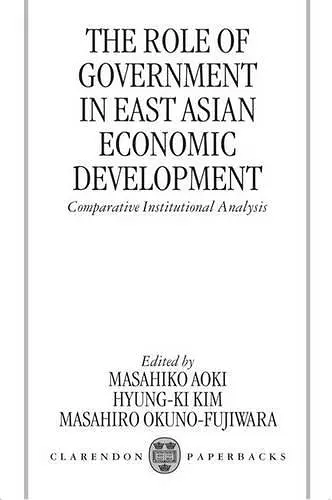The Role of Government in East Asian Economic Development
Comparative Institutional Analysis
Hyung-Ki Kim editor Masahiko Aoki editor Masahiro Okuno-Fujiwara editor
Format:Paperback
Publisher:Oxford University Press
Published:6th Aug '98
Currently unavailable, and unfortunately no date known when it will be back
This paperback is available in another edition too:
- Hardback£212.50(9780198292135)

The role of government in East Asian economic development has been a contentious issue. Two competing views have shaped enquiries into the source of the rapid growth of the high-performing Asian economies and attempts to derive a general lesson for other developing economies: the market-friendly view, according to which government intervenes little in the market, and the developmental state view, in which it governs the market. What these views share in common is a conception of market and government as alternative mechanisms for resource allocation. They are distinct only in their judgement of the extent to which market failures have been, and ought to be, remedied by direct government intervention. This collection of essays suggests a breakthrough, third view: the market-enhancing view. Instead of viewing government and the market as mutually exclusive substitutes, it examines the capacity of government policy to facilitate or complement private sector co-ordination. The book starts from the premiss that private sector institutions have important comparative advantages over government, in particular in their ability to process information available on site. At the same time, it recognizes that the capabilities of the private sector are more limited in developing economies. The market-enhancing view thus stresses the mechanisms whereby government policy is directed at improving the ability of the private sector to solve co-ordination problems and overcome other market imperfections. In presenting the market-enhancing view, the book recognizes the wide diversity of the roles of government across various East Asian economiesincluding Japan, Korea, Hong Kong, Malaysia, and China and its path-dependent and developmental stage nature.
This volume will certainly gain empathy from those social scientists who are keenly aware of the importance of institutions and histories as key determinants of economic development. The volume is full of new exciting concepts. The Asian perspectives developed in this volume have succeeded in 'disclosing certain limits of the neoclassical approach which evolved primarily in Anglo-American academia' the stated goal of the volume. T.Ozawa - The Journal of East Asian Studies - Vol 58/2
The rich institutional detail contained in the country-specific chapters make it a valuable refernce for students of East Asian development. - Heather Smith - Asian Pacific Economic Literature May 1999
ISBN: 9780198294917
Dimensions: 234mm x 156mm x 25mm
Weight: 656g
432 pages